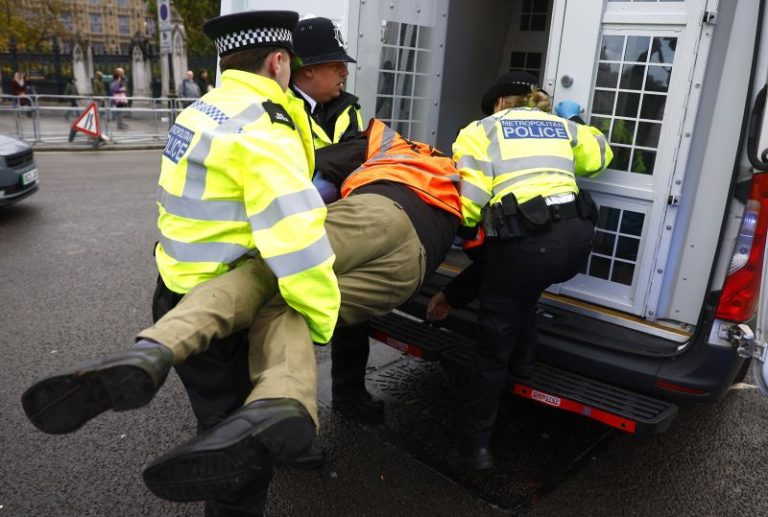A United Nations envoy said he was “alarmed,” “distressed” and “seriously concerned” by the treatment of climate activists in the United Kingdom, in a damning report published Tuesday that criticized “increasingly severe crackdowns” on peaceful protesters in the country.
Michel Forst, the UN’s Special Rapporteur on Environmental Defenders, who visited the UK earlier this month to meet with politicians, NGOs, activists and lawyers, said he had received “extremely worrying” information about peaceful protesters facing prosecution under “regressive” new laws, experiencing “harsh” bail conditions while awaiting trial, and being handed jail sentences.
British authorities have stepped up their response to climate and environmental protestors in recent years, especially when protests become disruptive, including blocking roads and slow walking tactics.
Last year, the the country introduced new legislation — the Public Order Act 2023 — giving police more power to stop protests. In December, the legislation was used to sentence a climate protester to a six-month prison term for taking part in a slow march on a public road as part of the activist group Just Stop Oil. The protester is now appealing the sentence.
“It had been almost unheard of since the 1930s for members of the public to be imprisoned for peaceful protest in the UK,” Forst wrote.
A spokesperson for the UK Home Office, the government department that tackles policing and other elements of national security, said that “while decisions on custodial sentences are a matter for the independent judiciary, the Public Order Act brings in new criminal offences and proper penalties for selfish, guerrilla protest tactics.”
Forst said he was “alarmed” to learn that some judges were banning defendants from explaining the motivation behind their protest, including mentioning climate change. “It is very difficult to understand what could justify denying the jury the opportunity to hear the reason for the defendant’s action,” he wrote.
The report referred to “highly concerning” information about “harsh” bail conditions for peaceful protesters awaiting trial — a period that could span up to two years — including wearing electronic ankle tags and curfews. “I seriously question the necessity and proportionality of such conditions for persons engaging in peaceful protest,” Forst wrote.
He also said he was “distressed” to see how environmental defenders are “derided” by the media and political figures in the UK. It puts them at risk of “threats, abuse and even physical attacks,” he said.
This “toxic discourse” can also be used by the government as justification for “adopting increasingly severe and draconian measures against environmental defenders,” he said.
“In the course of my visit, I witnessed firsthand that this is precisely what is taking place in the UK right now,” he said, adding this had a “significant chilling effect” on civil society and fundamental rights to peaceful protest.
Climate protesters are increasingly undertaking high-profile and disruptive actions. But the fact they cause disruption does not mean they are not peaceful, Forst said.
In January last year, one of the best known climate groups in the UK, Extinction Rebellion, announced it was pausing mass public disruption campaigns to focus on building more support.
But other organizations have scaled up their protests. Last year, Just Stop Oil, for example, disrupted several major sporting events in England, including Wimbledon, the Ashes cricket test series and the World Snooker Championship, as well as a performance of the musical “Les Misérables.”
This story has been updated with additional information.

